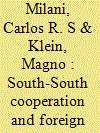|
|
|
Sort Order |
|
|
|
Items / Page
|
|
|
|
|
|
|
| Srl | Item |
| 1 |
ID:
183218


|
|
|
|
|
| Summary/Abstract |
This article aims to contribute to the critical understanding of how International Relations (IR) was built as a social science field within Brazil's modern project. I argue that the foundation and the development of IR in Brazil in the twentieth century is closely associated with foreign policy, on the one hand, and with the national geopolitical thinking, particularly in the aftermath of the Second World War, on the other. In its trajectory, Brazil's IR has been influenced, among others, by the analysis of domestic and systemic determinants of foreign policy, historical interpretations, the study of the components of state power, studies of diplomacy and its contribution to the country's development, the analysis of decision-making processes and to a lesser extent, cognitive approaches. This article is organised around three sections. First, I present a brief history of the geopolitical tradition in Brazil's IR. Second, I discuss IR development in Brazil, stressing the role of diplomats, the key contribution of intellectuals coming from social and human sciences, and finally the emergence of the first generations of IR scholars in the eighties. Third, I analyse the institutionalisation of the field, its quantitative and qualitative growth, presenting some data on its organisation in recent times.
|
|
|
|
|
|
|
|
|
|
|
|
|
|
|
|
| 2 |
ID:
178495


|
|
|
|
|
| Summary/Abstract |
Brazil’s government has historically engaged with other developing countries to promote technical cooperation. Since the 1988 federal Constitution, different presidents have paid attention to this foreign policy agenda. However, it was particularly under the Workers’ Party’s administrations (2003–2016) that South-South cooperation (SSC) gained political ground, rooted in official principles of South-South solidarity, horizontality, non-interference in domestic affairs, and the defence of a multipolar world-vision. In this article, based on the argument that international development cooperation (IDC) is a key instrument of a country’s economic diplomacy, we analyse the perceptions of Brazilian diplomats about SSC in order to understand Brazil’s interests and motivations in this field. Methodologically, the article discusses the main results of a survey conducted between 25 August and 23 September 2016 among 349 Brazilian individuals, who correspond to approximately 22 per cent of Brazil’s active diplomats. The survey results showed that Brazilian diplomats generally have a favourable perception on Brazil’s SSC programmes, and that a great majority of them has already acted in SSC activities. Still, the issue of political conditionality brings in cleavages, indicating that there is a large group of Brazilian diplomats who openly support SSC as an instrument of national interests and not because of the official narratives related to a ‘solidarity with the South’ or ‘the promotion of human rights’. As a consequence, with the exception of perceptions on political conditionalities and economic criteria, the majority of diplomats share commonalities that also correspond to the government’s official rhetoric between 2003 and 2016. This article is structured around the following three sections: (1) South-South cooperation as a foreign policy agenda, (2) Diplomats as agents of Brazil’s South-South cooperation and (3) Presenting and discussing the perceptions of Brazilian diplomats.
|
|
|
|
|
|
|
|
|
|
|
|
|
|
|
|
|
|
|
|
|